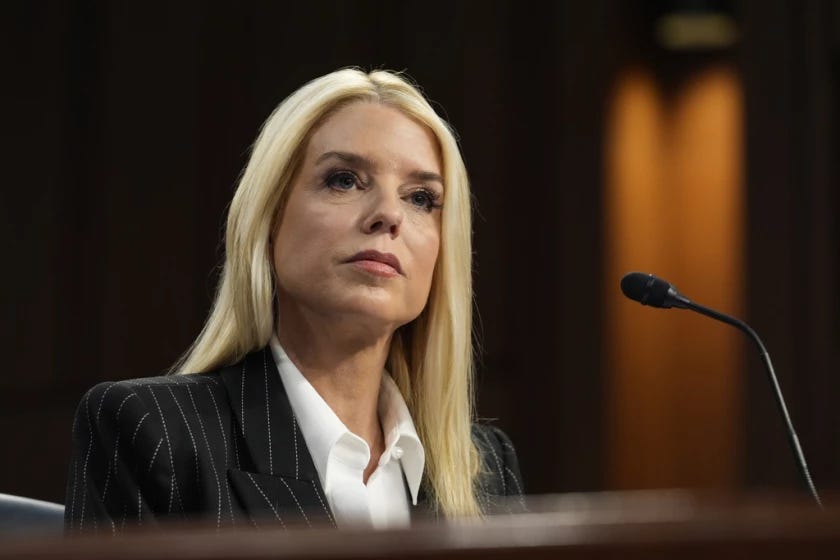Trump’s Thirteenth Week: Deportation Drive, Trade War Escalation, and Legal Fallout
From mass deportation goals to new tariffs on China, the week reveals growing tension between Trump’s federal agenda and human rights advocates, courts, and international partners.
Week thirteen of Trump’s second term saw further escalation in immigration enforcement, global trade tensions, and domestic policy rollbacks. Amid growing backlash over the wrongful deportation of Kilmar Armando Abrego Garcia, Salvadoran President Nayib Bukele refused to return Garcia to the United States. The move came as U.S. District Judge James Boasberg announced he had found probable cause to hold the Trump administration in criminal contempt, following The Introspective’s earlier reporting on officials defying his order to halt deportations.
President Trump responded by threatening to deport U.S. citizens to El Salvador, doubling down on anti-immigrant rhetoric. That same week, a federal judge ruled that Immigration and Customs Enforcement (ICE) may conduct raids in places of worship, triggering sharp criticism from civil rights advocates. Hours later, ICE arrested Palestinian and Columbia University student Mohsen Mahdawi during a citizenship interview. Mahdawi, a legal permanent resident, had already drawn attention for his advocacy on Palestine. His arrest follows prior coverage of Mahmoud Khalil, another Palestinian resident facing deportation after being arrested by ICE.
In trade, Trump threatened to impose 245% tariffs on Chinese imports, intensifying an ongoing trade war. This followed previous Introspective coverage of the administration’s 125% tariff hikes, which prompted Chinese retaliation. In response, Hong Kong suspended handling all packages from the United States.
California has sued the administration, calling the sweeping tariffs “illegal” given the existing 10% tariff still applied to all U.S. trade partners. Federal Reserve Chair Jerome Powell issued a warning about the economic consequences, as global markets continue to reel from mounting tensions.
As Trump’s initiative to downsize the federal government continues, the Internal Revenue Service (IRS) announced it will eliminate its free tax-filing system, impacting millions of Americans. At the same time, the Department of Health and Human Services (HHS) unveiled a proposed 30% budget cut, slashing funding for HIV/AIDS research, substance abuse treatment, and mental health services. Under the proposal, the National Institutes of Health (NIH) would be shut down entirely.
In light of actions taken by the Trump administration, the European Commission, a branch of the European Union (EU), began issuing burner phones and laptops to staff traveling to the United States as fears of espionage grow.
Meanwhile, following a previous Introspective report on Maine’s refusal to enforce an executive order banning transgender women from participating in women’s sports, the Department of Justice filed a lawsuit against the state, igniting backlash as LGBTQ+ rights remain a topic of debate.
Immigration Crackdown: A Boiling Point
As anti-immigrant sentiment reaches a boiling point, Salvadoran President Nayib Bukele said Monday he would not return Kilmar Armando Abrego Gracia—a legal permanent U.S. resident from Maryland—to the United States. A previous Introspective report highlighted Abrego Gracia’s wrongful deportation to El Salvador due to an “error.” However, Trump administration officials have refused to facilitate his return.
“How can I return him to the United States?” Bukele asked reporters, referring to Abrego Gracia as a “terrorist” despite no evidence.
“Of course I’m not going to do it. The question is preposterous.”
In a court filing, the Trump administration, which had previously claimed the U.S. could not retrieve Abrego Gracia because he is in Salvadoran custody, maintained its position.
“DHS does not have authority to forcibly extract an alien from the domestic custody of a foreign sovereign nation,” wrote Acting Homeland Security General Counsel Joseph Mazzara.
The next day, District Judge Paula Xinis criticized the Department of Justice (DOJ) for failing to comply with a Supreme Court order directing the return of Abrego Gracia. A previous Introspective report also detailed how Xinis ordered the DOJ to provide updates on his location and status.
“We have to give process to both sides, but we're going to move... there will be no tolerance for gamesmanship or grandstanding,” Xinis said Tuesday.
“To date, what the record shows is that nothing has been done. Nothing.”
Maryland Sen. Chris Van Hollen was denied entry to El Salvador’s Terrorism Confinement Center (CECOT)—where Abrego Gracia is being held—after traveling to the country to lobby for his release.
“I said, I’m not interested in this moment in taking a tour of CECOT. I just want to meet with Mr. Abrego Gracia,” Van Hollen told NPR, referencing a meeting with Salvadoran Vice President Félix Ulloa.
“He said he needed a little bit more time. I asked him if I came back next week whether I’d be able to see Mr. Abrego Gracia. He said he couldn’t promise that either.”
That same day, White House Press Secretary Karoline Leavitt claimed Abrego Gracia would “never” be able to return to the United States.
“If he ever ends up back in the United States, he would immediately be deported again,” Leavitt said.
“Nothing will change the fact that Abrego Gracia will never be a Maryland father. He will never live in the United States of America again.”
Leavitt later criticized Van Hollen for not acknowledging the killing of Rachel Morin, a Maryland resident who was raped and killed in 2023 by Victor Martinez-Hernandez, an undocumented immigrant from El Salvador.
“To have a senator from Maryland who didn’t even acknowledge, or barely acknowledged, my daughter and the brutal death that she endured, leaving her five children without a mother... so that he can use my taxpayer money to fly to El Salvador to bring back someone that’s not even an American citizen?”
During his meeting with Ulloa, Van Hollen was told that Abrego Gracia remains in custody because “the Trump administration is paying the government of El Salvador to keep him at CECOT.” A CBS investigation later found that the U.S. is paying El Salvador $6 million to detain immigrants at the facility, raising concerns as the president aims to carry out 1 million deportations in a single year.
President Trump has since threatened to send American citizens to the CECOT facility, warning about the presence of “homegrown criminals” in the country. The threat follows a new policy that now allows ICE to conduct raids in places of worship.
“We always have to obey the laws, but we also have homegrown criminals that push people into subways, that hit elderly ladies on the back of the head with a baseball bat when they’re not looking, that are absolute monsters,” Trump said.
“I’d like to include them.”
In an interview with NBC News, David Bier, an immigration expert at the Cato Institute, emphasized the unconstitutionality of Trump’s remarks.
“It’s absolutely critical for the courts to put an immediate stop to this extrajudicial imprisonment by foreign proxy,” Bier said.
“U.S. citizens may not be deported to imprisonment abroad. There is no authority for that in any U.S. law.”
Meanwhile, District Judge James Boasberg ruled Wednesday that he found probable cause to hold the Trump administration in contempt for disobeying an order that directed officials to halt deportations. This follows a previous Introspective report detailing Trump’s attempt to invoke the Alien and Sedition Acts—a 1798 law allowing the president to arrest and deport noncitizens during wartime.
“The court ultimately determines that the government’s actions on that day demonstrate a willful disregard for its order, sufficient for the court to conclude that probable cause exists to find the government in criminal contempt,” Boasberg wrote.
“The court does not reach such conclusion lightly or hastily; indeed, it has given defendants ample opportunity to rectify or explain their actions. None of their responses has been satisfactory.”
The White House has announced plans to file an appeal.
Meanwhile, after public backlash over the arrest of Palestinian activist Mahmoud Khalil, another Columbia University student and legal permanent resident—Mohsen Mahdawi—was arrested by ICE on Monday during an interview for his U.S. citizenship application. Mahdawi, who grew up in the West Bank, had participated in Gaza protests on campus but stepped back from organizing in March 2024.
“The Trump administration detained Mohsen Mahdawi in direct retaliation for his advocacy on behalf of Palestinians and because of his identity as a Palestinian,” wrote Mahdawi’s attorney, Luna Droubi, in a statement to CNN.
“His detention is an attempt to silence those who speak out against the atrocities in Gaza. It is also unconstitutional.”
A district judge in Vermont, where Mahdawi was arrested, issued a temporary order prohibiting his removal from the United States or from the state.
Trade War Intensifies
As the trade war escalates, President Donald Trump has threatened to raise tariffs against China to 245%, up from 125%. The move follows an executive order he signed Wednesday.
“China faces up to a 245% tariff on imports to the United States as a result of its retaliatory actions,” read a fact sheet published by the White House.
“This includes a 125% reciprocal tariff, a 20% tariff to address the fentanyl crisis, and Section 301 tariffs on specific goods ranging between 7.5% and 100%.”
Hong Kong, a special administrative region (SAR) of China, announced it would stop handling all packages from the United States in retaliation. The policy takes effect April 27.
“The U.S. is unreasonable, bullying, and imposing tariffs abusively,” Hong Kong’s government said in a press release.
“The public in Hong Kong should be prepared to pay exorbitant and unreasonable fees due to the U.S.’s unreasonable and bullying acts.”
Federal officials have warned of the consequences, with Federal Reserve Chair Jerome Powell highlighting rising global market instability.
“Markets are struggling with a lot of uncertainty, and that means volatility,” Powell said during an event in Chicago on Wednesday.
“The level of the tariff increases announced so far is significantly larger than anticipated, the same is likely to be true of the economic effects, which will include higher inflation and slower growth.”
“They’re functioning just about as you’d expect them to function,” he added.
Trump later responded to Powell’s comments on Truth Social, calling for his removal.
“Powell’s termination cannot come fast enough!” Trump wrote.
“He should have lowered interest rates long ago.”
In response to the tariffs, California—now the first state to take legal action in the ongoing trade war—filed a lawsuit against the Trump administration.
“President Trump’s unlawful tariffs are wreaking chaos on California families, businesses, and our economy — driving up prices and threatening jobs,” Gov. Gavin Newsom said in a press release.
“We’re standing up for American families who can’t afford to let the chaos continue, the president’s chaotic and haphazard implementation of tariffs is not only deeply troubling — it’s illegal. As the fifth-largest economy in the world, California understands global trade policy is not just a game.”
Government Downsizing, Legal Disputes, and EU Precautions
As President Donald Trump’s initiative to downsize the federal government continues, the Internal Revenue Service (IRS) announced plans to eliminate its Direct File program — a free online system for filing tax returns — impacting millions of Americans. The average citizen currently spends about $140 per year on tax preparation.
In a statement to The Associated Press, Sen. Elizabeth Warren criticized Trump and Elon Musk, head Department of Government Efficiency (DOGE), claiming the two “are going after Direct File because it stops giant tax prep companies from ripping taxpayers off for services that should be free. Americans want a free and easy way to file their taxes — Trump and Musk want to take that away.”
In the same report, Adam Ruben, vice president of the Economic Security Project, expressed outrage at the decision.
“It is an outrage to see everyday taxpayers play no role in this decision,” Ruben said, citing promises Trump made during the 2024 election campaign.
“Cutting costs and saving money for families were just empty campaign promises.”
Meanwhile, a 30% budget cut is planned for the Department of Health and Human Services (HHS), further straining the agency amid mass layoffs previously reported by The Introspective.
“Many difficult decisions were necessary to reach the funding level provided in this Passback,” the Office of Management and Budget wrote in a document obtained by Politico.
Under the proposal, funding for both the Centers for Disease Control and Prevention (CDC) and the National Institutes of Health (NIH) would be slashed by more than 40%. Several NIH agencies — including the National Institute on Minority Health and Health Disparities — face potential closure.
As part of the administration’s ongoing crackdown on LGBTQ+ rights, the Department of Justice filed a lawsuit against the state of Maine for refusing to enforce an executive order that bans transgender women from participating in women’s sports. The DOJ claims Maine is violating Title IX, a federal law prohibiting discrimination based on sex and gender identity.
A previous report by The Introspective noted Trump’s threat to revoke federal funding from all public schools in Maine that do not comply with the executive order.
“The state of Maine, through its Department of Education, is openly and defiantly flouting federal anti-discrimination law by enforcing policies that require girls to compete against boys in athletic competitions designated exclusively for girls,” the lawsuit reads, using transphobic language.
“By prioritizing gender identity over biological reality, Maine’s policies deprive girl athletes of fair competition, deny them equal athletic opportunities, and expose them to heightened risks of physical injury and psychological harm.”
Attorney General Pam Bondi, who announced the lawsuit Wednesday, said the case is about the safety of women and girls.
“The Department of Justice will not sit by when women are discriminated against in sports,” Bondi said.
“This is about sports. This is also about these young women’s personal safety. I met many of these women over the past weeks and months, and what they have been through is horrific.”
Maine Gov. Janet Mills responded to the DOJ's action, defending her record and the state’s policies.
“For decades — first as a district attorney, as attorney general, and now as governor — I have fought tirelessly for the rights of women and girls, for the health and well-being of children and families, and to defend the Constitution of Maine and the Constitution of the United States,” Mills said in a statement.
“My administration and Maine’s attorney general will vigorously defend our state against the action announced today by the Department of Justice.”
Separately, the European Commission has begun issuing burner phones and laptops to staff traveling to the United States to prevent espionage.
“They are worried about the U.S. getting into the commission systems,” an official told the Financial Times.
“The transatlantic alliance is over.”
The security measures — typically reserved for countries like China and Ukraine — underscore the growing divide in U.S.-EU relations.









